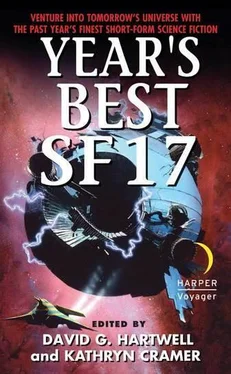In the rubble-strewn field that had once been SNOPB, several small windmills were twirling atop temporary masts. Below them were some shipping-container sized boxes with big grills in their sides. The site looked healthier than the surrounding prairie; there were actual green trees in the distance. Of course, this area had been wetlands and there’d been a creek running behind SNOPB; maybe it was still here, which was a hopeful sign.
“Headquarters told me that some kind of climate research group is using the site,” he told Ambrose as he pulled up and stopped the car. “But it’s still public land.”
“They built an anthrax factory less than five minutes outside of town?” Ambrose shook his head, whether in wonder or disgust, Gennady couldn’t tell. They got out of the car, and Ambrose looked around in obvious disappointment. “Wow, it’s gone.” He seemed stunned by the vastness of the landscape. Only a few foundation walls now stuck up out of the cracked lots where the anthrax factory had once stood, except for where the big box machines sat whirring and humming. They were near where the bunkers had been and, with a frown of curiosity, Gennady strolled in that direction. Ambrose followed, muttering to himself, “… Last update must have been ten years ago.” He had his glasses on, so he was probably comparing the current view to what he could see online.
According to Gennady’s notes, the bunkers had been grass-covered buildings with two-meter thick walls, designed to withstand a nuclear blast. In the 1960s and 70s they’d contained ranks of cement vats where the anthrax was grown. Those had been cracked and filled in, and the heavy doors removed; but it would have been too much work to fill the bunkers in entirely. He poked his nose into the first in line—Building 241—and saw a flat stretch of water leading into darkness. “Excellent. This job just gets worse. We may be wading.”
“But what are you looking for?”
“I—oh.” As he rounded the mound of Building 242, a small clutch of hummers and trucks came into view. They’d been invisible from the road. There was still no sign of anybody, so he headed for Building 242. As he was walking down the crumbled ramp to the massive doors, he heard the unmistakable sound of a rifle-bolt being slipped. “Better not go in there,” somebody said in Russian.
He looked carefully up and to his left. A young woman had come over the top of the mound. She was holding the rifle, and she had it aimed directly at Gennady.
“What are you doing here?” she said. She had a local accent.
“Exploring, is all,” said Gennady. “We’d heard of the old anthrax factory, and thought we’d take a look at it. This is public land.”
She swore, and Gennady heard footsteps behind him. Ambrose looked deeply frightened as two large men also carrying rifles, emerged from behind a plastic membrane that had been stretched across the bunker’s doorway. Both men wore bright yellow fireman’s masks, and had air tanks on their backs.
“When are your masters going to believe that we’re doing what we say?” said the woman. “Come on.” She gestured with her rifle for Gennady and Ambrose to walk down the ramp.
“We’re dead, we’re dead,” whimpered Ambrose shivering.
“If you really must have your proof, then put these on.” She nodded to the two men, who stripped off their masks and tanks and handed them to Gennady and Ambrose. They pushed past the plastic membrane and into the bunker.
The place was full of light: a crimson, blood-red radiance that made what was inside all the more bizarre.
“Oh shit,” muttered Ambrose. “It’s a grow-op.”
The long, low space was filled from floor to ceiling with plants. Surrounding them on tall stands were hundreds of red LED lamp banks. In the lurid light, the plants appeared black. He squinted at the nearest, fully expecting to see a familiar, jagged-leaf profile. Instead—
“Tomatoes?”
“Two facts for you,” said the woman, her voice muffled. She’d set down her rifle, and now held up two fingers. “One: we’re not stepping on anybody else’s toes here. We are not competing with you. And two: this bunker is designed to withstand a twenty kiloton blast. If you think you can muscle your way in here and take it over, you’re sadly mistaken.”
Gennady finally realized what they’d assumed. “We’re not the mafia,” he said. “We’re just here to inspect the utilities.”
She blinked at him, her features owlish behind the yellow frame of the mask. Ambrose rolled his eyes. “Oh God, what did you say?”
“American?” Puzzled, she lowered her rifle. In English, she said, “You spoke English.”
“Ah,” said Ambrose, “well—”
“He did,” said Gennady, also in English. “We’re not with the mafia, we’re arms inspectors. I mean, I am. He’s just along for the ride.”
“Arms inspectors?” She guffawed, then looked around herself at the stolid Soviet bunker they were standing in. “What, you thought—”
“We didn’t think anything. Can I lower my hands now?” She thought about it, then nodded. Gennady rolled his neck and indicated the ranked plants. “Nice setup. Tomatoes, soy, and those long tanks contain potatoes? But why in here, when you’ve got a thousand kilometres of steppe outside to plant this stuff?”
“We can control the atmosphere in here,” she said. “That’s why the masks: it’s a high CO2 environment in here. That’s also why I stopped you in the first place; if you’d just strolled right in, you’d have dropped dead from asphyxia.
“This project’s part of Minus Three,” she continued. “Have you heard of us?” Both Ambrose and Gennady shook their heads.
“Well, you will.” There was pride in her voice. “You see, right now humanity uses the equivalent of three Earth’s worth of ecological resources. We’re pioneering techniques to reduce that reliance by the same amount.”
“Same amount? To zero Earths?” He didn’t hide the incredulity in his voice.
“Eventually, yes. We steal most of what we need from the Earth in the form of ecosystem services. What we need is to figure out how to run a full-fledged industrial civilization as if there were no ecosystem services available to us at all. To live on Earth,” she finished triumphantly, “as if we were living on Mars.”
Ambrose jerked in visible surprise.
“That’s fascinating,” said Gennady. He hadn’t been too nervous while they were pointing guns at him—he’d had that happen before, and in such moments his mind became wonderfully sharp—but now that he might actually be forced to have a conversation with these people, he found his mouth going quite dry. “You can tell me all about it after I’ve finished my measurements.”
“You’re kidding,” she said.
“I’m not kidding at all. Your job may be saving the Earth next generation, but mine is saving it this week. And I take it very seriously. I’ve come here to inspect the original fittings of this building, but it looks like you destroyed them, no?”
“Not at all,” she said. “Actually, we used what was here. This bunker’s not like the other ones, you know they had these big cement tanks in them. I’d swear this one was set up exactly like this.”
“Show me.”
For the next half hour they climbed under the hydroponic tables, behind the makeshift junction boxes mounted near the old power shaft, and atop the sturdier lighting racks. Ambrose went outside, and came back to report that the shipping containers they’d seen were sophisticated CO2 scrubbers. The big boxes sucked the gas right out of the atmosphere, and then pumped it through hoses into the bunker.
At last he and the woman climbed down, and Gennady shook his head. “The mystery only deepens,” he said.
Читать дальше












